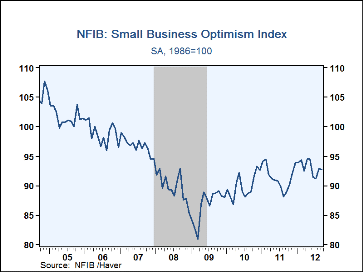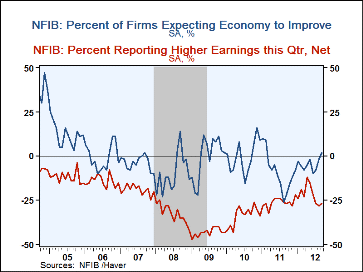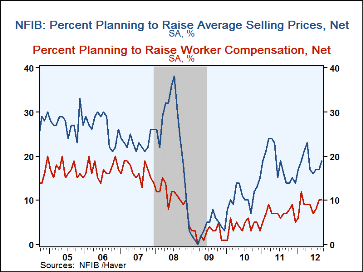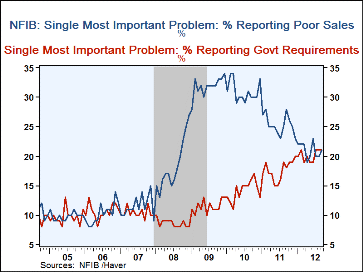 Global| Oct 09 2012
Global| Oct 09 2012U.S. Small Business Optimism Slips; Worry About Gov't Regulation Rises
by:Tom Moeller
|in:Economy in Brief
Summary
The National Federation of Independent Business indicated that its September Index of Small Business Optimism slipped to 92.8 from 92.9 in August. The Q3 average of 92.3 was its lowest this year. Recent weakness was led by fewer firms [...]
The National Federation of Independent Business indicated that its September Index of Small Business Optimism slipped to 92.8 from 92.9 in August. The Q3 average of 92.3 was its lowest this year. Recent weakness was led by fewer firms reporting higher real earnings this quarter over last. Also, fewer firms were planning to increase employment and fewer were going to raise capital expenditures in 3-6 months. Offsetting these declines was an increase in the percentage of firms expecting the economy to improve and more expecting credit conditions to ease.
The percentage of firms reporting that credit was harder to get fell to 6%, down sharply from the early-2009 high of 16%. The percentage planning to raise worker compensation held at 10%, up from the recession low of 0%. The percentage of firms lifting prices held at a stable 6% while an improved 19% were planning to raise prices.
The most important problems faced by small business were government requirements (a greatly increased 21%), poor sales (a greatly lessened 21%), taxes (21%), inflation (7%), insurance cost & availability (7%), competition from large businesses (7%), quality of labor (6%), cost of labor (3%) and financial & interest rates (2%).
Roughly 24 million small businesses exist in the U.S. and they create 80% of all new jobs. The typical NFIB member employs 10 people and reports gross sales of about $500,000 a year. The NFIB figures can be found in Haver's SURVEYS database.
| National Federation of Independent Business | Sep | Aug | Jul | Sep '11 |
2011 | 2010 | 2009 |
|---|---|---|---|---|---|---|---|
| Small Business Optimism Index (SA,1986=100) | 92.8 | 92.9 | 91.2 | 88.9 | 91.4 | 89.9 | 86.7 |
| Firms Expecting Higher Real Sales In Six Months (Net %) | 1 | 1 | -4 | -6 | 3 | 1 | -11 |
| Firms Expecting Economy To Improve (Net %) | 2 | -2 | -8 | -22 | -9 | -1 | -0 |
| Firms With One or More Job Openings (Net %) | 17 | 18 | 15 | 14 | 14 | 10 | 9 |
| Firms With Few or No Qualified Applicant For Job Openings (Net %) | 41 | 37 | 38 | 34 | 32 | 27 | -- |
| Firms Reporting That Credit Was Harder To Get (Net %) | 6 | 7 | 7 | 10 | 10 | 13 | 14 |
| Firms Raising Avg. Selling Prices (Net %) | 6 | 9 | 8 | 6 | 5 | -12 | -20 |
Tom Moeller
AuthorMore in Author Profile »Prior to joining Haver Analytics in 2000, Mr. Moeller worked as the Economist at Chancellor Capital Management from 1985 to 1999. There, he developed comprehensive economic forecasts and interpreted economic data for equity and fixed income portfolio managers. Also at Chancellor, Mr. Moeller worked as an equity analyst and was responsible for researching and rating companies in the economically sensitive automobile and housing industries for investment in Chancellor’s equity portfolio. Prior to joining Chancellor, Mr. Moeller was an Economist at Citibank from 1979 to 1984. He also analyzed pricing behavior in the metals industry for the Council on Wage and Price Stability in Washington, D.C. In 1999, Mr. Moeller received the award for most accurate forecast from the Forecasters' Club of New York. From 1990 to 1992 he was President of the New York Association for Business Economists. Mr. Moeller earned an M.B.A. in Finance from Fordham University, where he graduated in 1987. He holds a Bachelor of Arts in Economics from George Washington University.










